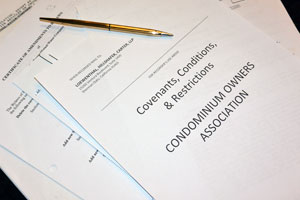LHC Newsletter Vol. 4, No. 5
Announcement – LHC Partners Obtain $3,246,500 For 23 Unit Condominium Association (Traviatta v. TBCI Concrete Structures, et al.)
We are pleased to announce that LHC recently obtained more than $3,230,000 in pre and post trial settlements for the homeowners association of a 23 unit condominium project in Los Angeles. The Traviatta project suffered from construction defects, including excessive deflection in the elevated concrete deck that supports the residential structure, structural framing resting in standing water, and damages including sloping floors, wracked doors and windows and damaged finishes throughout the building.
In mid 2008, LHC filed a lawsuit against approximately 16 parties including the developer, general contractor, and various subcontractors. What made the case more challenging was that the developer had no insurance and filed for bankruptcy protection and the general contractor was bankrupt and its insurance policy did not provide coverage because it excluded work done relating to condominium projects. (These insurance issues, among others, are discussed elsewhere in this Newsletter – see following Contract Primer article.)
During the course of the case, we were able to reach settlements totaling $2,146,500 with 13 subcontractor parties. As the highest offer from the remaining concrete subcontractor was only $500,000, we proceeded to trial. At the end of the trial, we sought damages totaling $2,639,288. The Court ruled in favor of our client for the entire amount sought – $2,639,288. After trial, a settlement was reached with the concrete subcontractor, bringing the total recovery to
$3,246,500 for the Association. After a hard fought battle, we were able to obtain an outstanding result for the Association.
A PRIMER ON CONSTRUCTION / MAINTENANCE CONTRACTS
By Kevin P. Carter, Esq. – Partner
If you are a manager or Board member, it is likely that you will have the task of reviewing and/or entering into a contract for construction or maintenance services at some point. Because most contractors or service providers routinely prepare and provide their own proposed contracts, many people fail to realize that the terms of these contracts are negotiable. Moreover, contracts prepared by the contractor are generally very one-sided and offer little, if any, protection for an association. Though it is not possible to know in advance how willing a contractor will be to negotiate the terms of his or her contract, it is wise to understand the purpose and intent of several provisions that appear often in construction related contract proposals. However, it remains prudent to ask an attorney to carefully review and negotiate important contracts on a case by case basis.
1. Limitations on Liability / Exculpatory Clauses – A contractor should be prepared to stand behind his work and accept responsibility if he provides deficient services. Unfortunately, many contractors do not share this view and prepare their contracts accordingly. Contract clauses that attempt to limit liability for defective work take many forms, but each takes away rights the Association, or any client, have under California law.
Our office frowns upon these “get out of jail free” contract clauses and virtually always recommends attempting to delete or modify such language. Following are just a couple of examples of such forms these provisions take:
- “Contractor shall not be liable to Association for any acts and omissions other than intentional or grossly negligent acts”;
- “Contractor’s liability for damages is limited to the dollar amount paid to Contractor under this contract”;
- “Association agrees to waive any and all consequential damages arising from Contractor’s work.”
What the above examples share in common is the intent to severely limit, or avoid, the Contractor’s liability for substandard work. Attempts should be made to modify or delete these “exculpatory” clauses if possible.
2. Inclusion of Representations / Warranties – Many written agreements prepared by contractors fail to promise to provide services in a workmanlike and defect free manner. When you enter into an agreement for construction, repair, or maintenance, you assume the work will be performed competently. Moreover, we suggest a representation in any construction contract that the contractor will comply with the City approved plans and specifications, all building codes, and all applicable government requirements. Inclusion of these promises makes life much easier should problems arise during the project or later. The contractor should be willing to warrant its work, at least minimally, in the Agreement.
3. Provision for Reimbursement of Attorneys Fees – When entering into a contract, an Association usually focuses on the cost and logistical issues and not about potential future litigation. However, if the project does not work out as planned, formal legal action may become the only viable alternative. It is very important that a provision be included entitling the prevailing party (in litigation or arbitration) to be reimbursed for expenses, specifically attorney fees and costs and expert consultant fees and costs. Litigation can be expensive and without such an attorneys fees clause, the Association can never recover these potentially significant expenses.
4. Scope of Work and Timeline – In the event that a dispute arises during or after the construction or repair, it is important that the written agreement clearly delineate both the specific work to be performed and the timeframes for completion. It is also a good idea, where possible, to base periodic payments on significant milestones in the construction.
5. Insurance Coverage – Construction or service contracts should always require that the service provider carry insurance. But what does this mean? A simple representation that the contractor has insurance is a far cry from providing coverage for a specific act or omission in the future. Generally, at least three types of insurance are strongly recommended: liability, workers compensation, and automobile coverage. Especially regarding the liability insurance, the policy limits should be more than enough to cover damages should the work be performed deficiently.
Many liability policies do not provide coverage for work performed for a condominium or multi family residential project. Unfortunately, it may not be enough to require only proof of insurance – verification that the liability policy provides coverage for your particular type of development should be required as well. There are many other insurance issues that cannot be addressed in the confines of this article.
6. Change Orders and Cost Contingencies – Upon examination, many “fixed cost” contracts contain cost contingencies. A contingency is an estimate and not a promise as to what that item will cost. There are situations where a cost contingency is fair and reasonable and there are other situations in which an Association or Owner should ask for an actual cost. If there are true “unknowns” about a line item or if the customer has not chosen a finish detail, for example, a contingency may make sense.
Likewise, change orders may be appropriate and unavoidable. To ensure that you are not “change ordered to death,” a contract should require change orders to be in writing and signed by the contractor and the client. Moreover, the contract should require a reasonable level of specificity for change orders including, but not limited to, anticipated delay (if any), cost, and detailed scope of work.
The above examples are just a few pointers to consider when reviewing a proposed agreement and are cited for discussion purposes only. Each proposed contract should be analyzed on a case by case basis, taking into account all surrounding circumstances. The attorneys at Loewenthal, Hillshafer & Carter, LLP are always available to negotiate on your behalf to ensure as fair and non-biased contract as possible.
©2010 by Loewenthal, Hillshafer & Carter, LLP. All rights reserved. Permission is granted to reproduce or transmit in any form any part of this newsletter as long as proper attribution to Loewenthal, Hillshafer & Carter, LLP is given. Due to the rapidly changing nature of the law, information contained in this publication may become outdated. As a result, lawyers and all others using this material must research original sources of authority.


